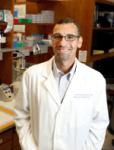There are more treatment options than ever for people with early-stage lung cancer, but only 20% of people are diagnosed at stage I or II. Routinely diagnosing and treating lung cancer in its earliest stages should be the norm, not the exception.
The early detection research projects LUNGevity funds are focused on this goal so more people with lung cancer can live longer and fuller lives by starting treatment sooner when the disease is most treatable—and often curable.
Research grants are delivering exciting progress for early detection projects aimed at:
- Creating a blood-based detection test
- Leveraging genetics to understand why younger adults are developing lung cancer
- Creating a best practices roadmap for lung cancer screening implementation










